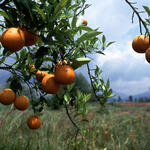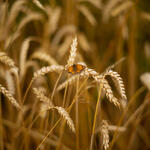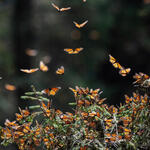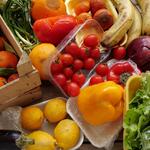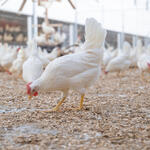- Date: 26 April 2023
At least 35% of all food in the US is left behind in fields or goes to waste, while millions of Americans face food insecurity. Businesses, government agencies, funders, and many others are already taking huge strides to address this challenge. But a patchwork of initiatives, no matter how impressive or innovative, will never be enough to make the rapid and dramatic reductions in food waste required to sustain ourselves and our planet. We cannot solve this problem without ambitious leadership and action on the federal level and across all 50 states. This is where the Zero Food Waste Coalition comes in.
- Date: 25 April 2023
- Author: Alex Nichols-Vinueza, Program Manager, Food Loss and Waste; Leigh Prezkop, Senior Program Officer, Food Loss and Waste
Thus far, the regenerative agriculture movement and its impacts on land rehabilitation have held little consensus. Many broadly reduce this farming approach to practices like no-till, crop rotations, and cover cropping with the simple purpose of reducing chemical and fertilizer inputs. Others underscore the movement's role in reorienting our production philosophies to emphasize reciprocal relationships with the environment and our food systems. For World Wildlife Fund, regenerative agriculture is centered on being deforestation and conversion free, rebuilding soil health, protecting water ecosystems, and supporting biodiversity, food producers, and agricultural communities.
As it stands, roughly 15% of all food produced is wasted at the farm stage, according to WWF’s recent Driven to Waste report. For farmers, this has meant the immediate loss of profits and reduced productivity in farmland over time. However, regenerative agriculture has the potential to revitalize ecosystem services and help reduce on-farm food loss and waste. To date, there has been limited research into how the farming methods associated with regenerative agriculture can reduce these adverse effects – and WWF aims to fill this gap.
- Date: 19 April 2023
April 22 is Earth Day, a time to appreciate everything the natural world provides for us—from the water that replenishes us, to the food that nourishes us, and the trees that help provide the oxygen we breathe, we celebrate the planet we call home. It’s also a day to encourage more climate-friendly choices and shed light on the pressing environmental challenges we’re facing today.
The 2022 Living Planet Report showed us that climate change and biodiversity loss are the twin emergencies of our time, threatening the well-being of current and future generations. However, we also learned we have the capability to reverse these trends. It’s more important now than ever that we make our planet a priority. In continuation of last year’s Earth Day theme, we ask that everyone “Invest in Our Planet,” once more.
More transformation action is needed, and we can’t do it alone. We need everyone - business, governments, and individuals like you - to help create lasting change. Through collective individual actions, we can invest in our planet’s future by making more sustainable lifestyle choices, urge greater climate action from both our government officials and business leaders, and support organizations that are making a difference.
- Date: 13 April 2023
In the lead-up to Earth Day on April 22, WWF is celebrating Monarch Week to call attention to the dramatic decline of the migratory monarch butterfly population. The week-long campaign encourages millions of Americans to help stem the decline of the charismatic species by planting critical milkweed habitat needed along its annual migration route and supporting WWF’s global conservation efforts.
This year WWF is also partnering with world-renowned Chef José Andrés and his Washington, DC-based restaurant Oyamel. From April 17-23, Jose and WWF will be connecting with social media followers and restaurant patrons about the need to save the migratory monarch butterfly. Digital and in-restaurant materials will highlight the plight of the monarch butterfly, WWF’s work to conserve the species, and invite people to take action.
- Date: 12 April 2023
- Author: Katherine Devine, Director of Business Case Development, WWF
ChatGPT has been all over the news for its ability to create well-written concepts with minimal prompting, leading many to herald a new era of artificial intelligence. But it’s not the only game in town in terms of innovative AI. WWF, in collaboration with the Pacific Coast Food Waste Commitment (PCFWC), Afresh, and Shelf Engine, conducted pilots using AI purchasing systems in two different grocery retail chains to reduce food waste and improve profits. The results were impressive: food waste was reduced by 14.8% per store on average.
- Date: 06 April 2023
- Author: Lindsay Petelinkar, Senior Corporate Sustainability Analyst for Lowe’s
Taking a moment to stop and reflect on my career journey has been uplifting. How did I get here?
As a Senior Corporate Sustainability Analyst for Lowe’s, the majority of my daily focus pertains to forestry and responsible wood sourcing. Within my role, I am also able to work collaboratively on other sustainability-focused projects. This job is a dream come true for me as a passionate environmentalist and it’s also an incredible learning opportunity for an early-career professional. In my role, I’m able to harness my passion for the environment to execute projects that support our mission to help Lowe’s customers live more sustainably at home and that inspire tangible change in a corporate setting.
- Date: 29 March 2023
- Author: Julia Kurnik, Senior Director of Innovation Startups, WWF Markets Institute
Our food system needs to change. In the US, we produce more food than is needed, yet 53.6 million people, including 17% of children and 24% of Black individuals, don’t have consistent access to healthy food. Millions face hunger while we waste up to 40% of fresh fruits and vegetables. This comes with an environmental impact, too. Food production is the largest human impact on nature, accounting for 70% of biodiversity loss, 70% of freshwater use, and up to 30% of greenhouse gas emissions (FAO, IPCC). Meanwhile, our appetites, especially for things like protein, are growing faster than our population. We need to figure out how to grow more and waste less while reducing our impact on the planet.
- Date: 22 March 2023
- Author: Tim Rice and Natalie Shahbol
The United Nations 2030 Agenda for Sustainable Development, adopted by all UN member states in 2015, provides a shared blueprint for peace and prosperity for people and the planet, now and into the future. At its heart are the 17 Sustainable Development Goals (SDGs), which recognize that ending poverty and other deprivations must go hand-in-hand with strategies that improve health and education, reduce inequality, and spur economic growth—all while tackling climate change and working to preserve nature.
- Date: 20 March 2023
- Author: Sheila Bonini, Senior Vice President, Private Sector Engagement
It’s not a shocking revelation to say that water is the lifeblood of business. We know that every industry—indeed every company, organization, and person on Earth—needs clean and ample freshwater to survive. It’s such an obvious fact that we take it for granted and forget. For many of us, it’s difficult and frightening to even imagine a world in which we no longer have access to the water we need. Maybe this is why water stewardship never seems to get the attention it deserves. But we no longer have that luxury.
This week, the United Nations hosts the 2023 Water Conference, the first in nearly 50 years. All of us at WWF are thrilled to see water take center stage in a global platform. And I’m personally so excited to see the enthusiastic engagement, participation, and support from so many of the world’s leading companies. The reason for this goes beyond an altruistic notion to save the planet—though of course we admire and encourage that; it’s about making sure their business stays in business.
- Date: 09 March 2023
- Author: Katherine Devine, WWF and Sandra Vijn, Kipster
WWF has written previously about turning food waste into animal feed, finding that 14.7 million tons in the US could be safely used for animal feed rather than go to landfills. A new WWF paper highlighting Netherlands-based egg company Kipster’s US expansion goes a step further, arguing that we should consider relabeling “food waste” to “surplus food.”
